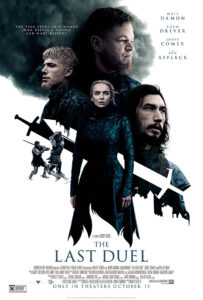The Last Duel
Posted on October 14, 2021 at 9:49 pm
C| Lowest Recommended Age: | Mature High Schooler |
| Profanity: | Some strong language |
| Alcohol/ Drugs: | Alcohol |
| Violence/ Scariness: | Very intense medieval combat violence, characters injured and killed, brutal rape, graphic and disturbing images |
| Diversity Issues: | A theme of the movie |
| Date Released to Theaters: | October 15, 2021 |

Like the classic “Rashomon,” this is the story of a rape and a death told from three different points of view. Damon and Affleck wrote the segments of the two male characters in the story, and the third segment, the point of view of the woman involved, was written by indie writer-director Nicole Holofcener.
It is based on real historical events, the last officially recognized “judicial duel,” meaning a battle to the death to determine the outcome of a trial, fought in France. The duel was fought in 1386, based on the notion that God would not let the combatant telling the truth lose the fight.
At one point the two men were friends, but they were very different. Jean de Carrouges (Damon) was a knight (he gets very angry when his hard-won title is not recognized). He was extremely brave and firmly dedicated to his ideals of honor. We first see him disobeying orders and going into battle to prevent the slaughter of innocent citizens. He was not educated and could not read or write his name. After his wife and son died, he married Marguerite (Jodie Comer) the daughter of a wealthy but disgraced (for supporting the losing side in the war) man. She was well-educated and they were genuinely affectionate and devoted.
Squire Jacques Le Gris (Adam Driver) was well-educated in languages, literature, and numbers. He was something of a libertine, encouraged by his patron (Affleck), Pierre d’Alençon, a powerful nobleman, after Le Gris ingratiated himself by straightening out the books and collecting the back taxes.
Marguerite tells her husband that when he was away Le Gris came to their home and raped her. Rape, at the time, was not considered an assault on the woman but a crime against the man in her life. She was seen as his property and it was he who was damaged by the degrading attack. Marguerite is encouraged not to tell anyone by her mother-in-law, who admits that she was once raped as well. To accuse a man so close to the nobility is dangerous. But de Carrouges has courage in life as he does in battle and a sense of honor — plus some more personal grievances against Le Gris — that will not allow him to pretend it did not happen. He knows Le Gris’ patron will protect him, so he takes the case to the king. And that is what takes us back to the joust we glimpse at the beginning of the film. If de Carrouges wins, that means God has protected him for telling the truth. If Le Gris wins, then he will be deemed to have told the truth and Marguerite will be burned for falsely accusing him.
Scott does a great job with the combat scenes and special credit goes to DP Dariusz Wolski and especially to the sound crew for some of the all-time great clanky sounds as swords strike shields and armor. Unfortunately, the dialogue is even more clanky. Affleck and Damon, whose Bahston townie talk in “Good Will Hunting” was both believable and exceptionally sharp, have made the dialogue in this film heavy with clumsy exposition. The reiteration of the story does not add as much as it thinks it does, and ultimately becomes tedious and heavy-handed. And the hair and make-up may be based on historic styles, but Affleck, as the louche embodiment of white privilege, has a blonde surfer look while Damon has an unfortunate mullet that goes with his unfortunately superficial character. This is the second time in a row that he has tried to convince us he’s an uneducated person of limited experience and both movies suffer from his efforts.
Parents should know that this film has strong, bloody violence with medieval combat and disturbing and grisly images. There is some strong language, explicit sexual situations with nudity and a brutal rape, and alcohol.
Family discussion: Why does de Carrouges decide to believe Marguerite? Given the ideas at the time, was his mother right?
If you like this, try: “Gladiator”
